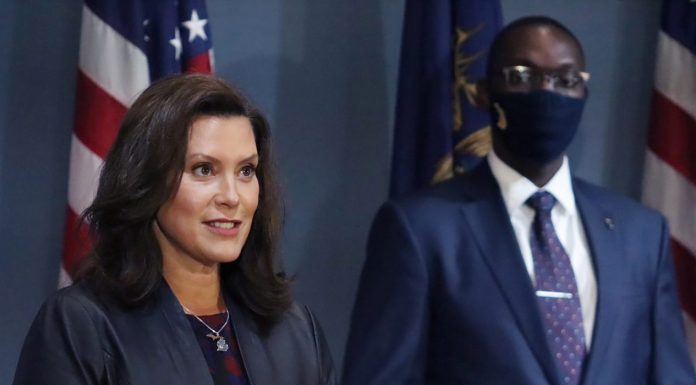(Headline USA) Michigan‘s health chief said Tuesday he has “broad” legal authority to enforce draconian lockdown demands under the state’s emergency regulations, despite a recent court ruling that struck down the Nazi-era law cited by Gov. Gretchen Whitmer.
Robert Gordon, director of the state Department of Health and Human Services, issued additional orders reinstituting restrictions negated by a state Supreme Court ruling and requiring schools to notify the public of infections.
He also reinstated rules for nursing homes and other congregate-care settings.
Michigan was among four Democrat-led states that controversially forced nursing homes to comingle healthy and infected patients during the early days of the pandemic, although it since has dialed back the demand.
More than 7,100 residents of the state have died with confirmed or probable COVID-19 infections.
Gordon also told local health departments to inform K-12 schools within 24 hours of learning of a confirmed or probable case of COVID-19. A school must post it on its website within 24 hours of being notified.
The steps came a day after Gordon ordered the wearing of masks and limits on gathering sizes following the court decision that declared unconstitutional the law Whitmer had used to unilaterally extend an emergency order and underlying virus-related restrictions.
Many in the state chafed at her perceived power-grab, which favored Democrat pet causes like marijuana dispensaries and abortion clinics as “essential” services while prohibiting citizens from visiting their family members or traveling anywhere on nonessential business.
While the court determined that the 1945 law, which the governor had asserted to circumvent the GOP-led legislature, was obsolete, Gordon cited a 1978 law that empowers him to act.
That law stemmed from a 1919 law that was enacted after the Spanish flu pandemic.
“It’s a broad grant of authority,” he told The Associated Press by phone. “The actions we’re taking fall well within it.”
More legal challenges are now likely to force the two opposing sides back to the state Supreme Court.
A Republican legislative leader has come out against codifying mask and other rules into law, saying businesses, nonprofits and schools can make their own decisions nearly seven months into the outbreak.
Gordon said such restrictions cannot be voluntary. He said to expect additional orders soon.
“Orders matter. The law matters. They set common expectations, and they help everyone know what they need to do,” he said. “The science behind what we are doing is 100% clear. Masks reduce the spread of COVID. Social distancing reduces the spread of COVID.”
The state also was expected to keep in place workplace safety rules such as limiting restaurant capacity to 50%.
Patrick Wright directs the Mackinac Center Legal Foundation, which helped file the case that reached the state Supreme Court.
He said the governor will have the power to do “many of the things that she had done before. But it’s most likely that she will not be able to do everything.”
Whitmer, for instance, has called on legislators to return to session because an order that was nullified had extended state unemployment benefits from 20 weeks to 26 weeks.
People out of work during the pandemic also can receive an additional 13 weeks of payments from the federal government once they exhaust their state benefits and, if the unemployment rate remains high, up to 20 more weeks.
It is unclear if the Republican majority will agree to the 26 weeks. Senate Majority Leader Mike Shirkey said this week that an “arm wrestling contest” will take place on that issue, and lawmakers also will review other provisions in the governor’s unemployment order.
The Senate will meet Thursday to vote on “time-sensitive” bills that were not immediately specified, with the House planning to hold session Oct. 13. Before the ruling, the chambers had been unlikely to meet until after the November election.
“We will do everything we can to make sure the people of Michigan have peace of mind about the state’s response and about their future,” Shirkey and House Speaker Lee Chatfield said in a Tuesday statement.
Gordon, a Whitmer appointee, has drawn legal scrutiny in his own right during the pandemic after the state health department attempted to grant a no-bid contact-tracing contract to a highly partisan Democrat canvassing firm.
During hearings on the scandal, it came to light that the health officials had also consulted with a top Democrat operative—currently leading the Biden campaign’s efforts in the state—about prospective candidates.
Gordon shrugged off the criticism from concerned citizens and political opponents, insisting that regardless of whether people may support or oppose his orders, he is simply doing what he knows is best for them.
“For their sake, for their loved ones and for all of us, please wear a mask, socially distance, wash your hands,” he said. “The virus doesn’t care about the politics. The virus is on the move.”
Adapted from reporting by the Associated Press

